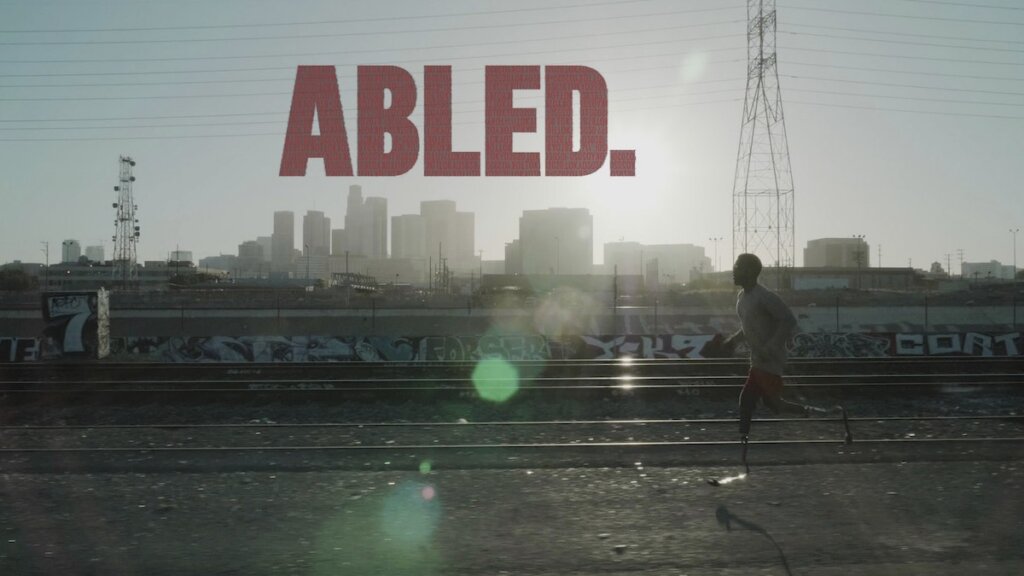 Abled is an inspirational film but it is not inspiration porn. This documentary, which is part of the 2023 Dances with Films festival, follows Paralympian Blake Leeper training for the 2020 Tokyo Olympic and Paralympic Games while he is in a legal battle with the World Athletics on whether his prosthetic legs give him an advantage. He is a 400-meter runner who competed in both disabled and nondisabled spaces throughout college and into his professional career, until he ran 400-meters in under 45 seconds. Once he crossed the 45 seconds line, he was on par with any world class nondisabled runner, and World Athletics claimed that he was technologically doping. However, the organization did not need to prove that claim; instead, they shifted the burden of proof to Leeper; he had to prove that the prosthetics did not give him an advantage. He had to disprove ableist assumptions rather than the institution having to back up its ableist thinking. This documentary shows Leeper trying to prove that his advantage comes from hard work and dedication, not his equipment.
Abled is an inspirational film but it is not inspiration porn. This documentary, which is part of the 2023 Dances with Films festival, follows Paralympian Blake Leeper training for the 2020 Tokyo Olympic and Paralympic Games while he is in a legal battle with the World Athletics on whether his prosthetic legs give him an advantage. He is a 400-meter runner who competed in both disabled and nondisabled spaces throughout college and into his professional career, until he ran 400-meters in under 45 seconds. Once he crossed the 45 seconds line, he was on par with any world class nondisabled runner, and World Athletics claimed that he was technologically doping. However, the organization did not need to prove that claim; instead, they shifted the burden of proof to Leeper; he had to prove that the prosthetics did not give him an advantage. He had to disprove ableist assumptions rather than the institution having to back up its ableist thinking. This documentary shows Leeper trying to prove that his advantage comes from hard work and dedication, not his equipment.
Inspiration Porn is one of the most common problematic portrayals of disability in media. It is using people with disabilities to inspire non-disabled people and creates a view that disabled people are less than. Disabled people face so many challenges in their everyday lives that doing anything that nondisabled people can do including everyday tasks is viewed as inspirational. Abled shows an interesting reversal. Leeper’s disability is seen as an advantage as soon as he is able to compete with the best nondisabled athletes in the world. Leeper discusses how this shift happens, “the message that they are sending is disabled human beings across the board are less than us. Because you are less than you should never be faster than me. If you are faster than its technological doping not training or hard work or effort.” While the conclusions are opposite, the core ableist thinking is the same.
There are many opportunities for this film to dip into inspiration porn and for the most part they are avoided. In the director’s statement, director Einar Thorsteinsson talks about a promise he made Leeper “to capture something authentic; simply let the camera roll and capture what he was going through every day as a disabled person.” You see that goal come out through the film when Leeper is both on and off the track. While he is in training, he is also in love and becoming a father. The conversation around him being made into an inspiration by the public is also not avoided. In home videos, you see his dad poking fun at people’s desire to make him an inspiration when interviewing Leeper and asking why “everyone thinks you are so special.” Leeper’s response is because his is smart and strong. Fast forward to adulthood, when he talks about inspiration, he hopes to be an inspiration for other disabled people. A main problem with inspiration porn is the nondisabled audience. It is not bad to be inspirational especially if Leeper is inspiring other disabled athletes. When there are small moments of inspiration porn, they are not coming from Leeper or his inner circle but rather strangers, such as reporters on the local news.
The documentary does not avoid the potential eventual realities of technological doping. The scientists arguing that his current prosthetics in no way give an advantage and probably give a disadvantage understand that as technology rapidly improves, tests will need to continue to see if that changes. While they continue to research, there is a clear need to recognize intersectionality in disability. The World Athletics uses research around assumed heights for amputees to claim that Leeper’s taller prosthetics are giving him an advantage. However, the research they are reporting did not study any Black men. Leeper has to change his prosthetics after a decade of training because of a study that does not reflect his race. His intersectional identity as a Black disabled man opens him up to even more discrimination.
As with almost every movie that has to do with sports, this film is inspirational; it is par for the genre. However, it is not inspirational because he is a disabled man, it is inspirational because he worked to be one of the fastest runners of all time (only about 100 people ever have been able to run 400-meters in under 45 seconds) and he continues to find ways to fight against ableist institutions and their thinking. Leeper is asking people to view him as an athlete full stop and give him the ability to compete with people at his level. It creates a new version of inspirational disability content, making it a must see.







